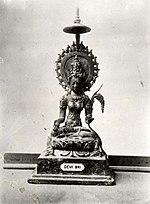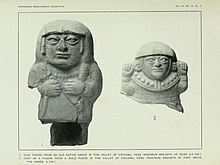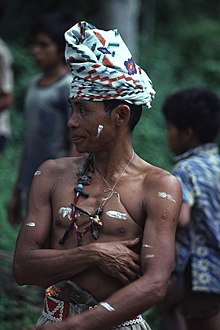
| This article is a part of the series on |
| Indonesian mythology and folklore |
|---|
 |
|
|
| Part of a series on |
| Anthropology of religion |
|---|
 |
| Social and cultural anthropology |
| Part of a series on |
| Medical and psychological anthropology |
|---|
| Social and cultural anthropology |
Dukun is an Indonesian term for shaman.[1] Their societal role is that of a traditional healer, spirit medium, custom and tradition experts and on occasion sorcerers and masters of black magic. In common usage the dukun is often confused with another type of shaman, the pawang. It is often mistranslated into English as "witch doctor" or "medicine man". Many self-styled dukun in Indonesia are simply scammers and criminals, preying on people who were raised to believe in the supernatural.[2]
The dukun is the very epitome of the kejawen or kebatinan belief system indigenous to Java. Very strong and ancient beliefs of animism, ancestor worship and shamanism are held by the people of the Nusantara. While medical doctors and revivalist Islam and Christianity have caused a decrease in the prominence of dukun, they remain highly respected and somewhat feared figures in Indonesian-Malay society, even in the most orthodox Muslim-dominant areas. In the pre-colonial past, dukun were exempt from paying taxes, as with Hindu priests and Buddhist monks.
Many highly prominent and highly educated Indonesians, Malaysians and Singaporeans, even those with Western doctorate and masters levels degrees will still consult dukun or soothsayers. Indonesians who are known to have employed dukun include former President Sukarno, former president Suharto, former president Megawati Sukarnoputri, Sultan Hamengkubuwana IX and Sultan Hamengkubuwana X and many more.[citation needed]
Dukun are most common on the island of Java, though the island of Madura is especially feared for being very powerful practitioners of dark magic, and Bali is well regarded for its dukun. The Dayak people of Kalimantan are also feared for their use of dukun when head-hunting. In Sabah, the Kadayan community are known for their dukun who are said to look waif-like with red eyes.
In common practice, a dukun is consulted when a person perceives they have an issue that has a supernatural or paranormal association. If a dukun is not known to the individual, their family or friends, word of mouth often creates a situation where the dukun will appear as if summoned, most especially in the case of possessions.

- ^ Graham Harvey; Robert J. Wallis (5 February 2007). Historical Dictionary of Shamanism. Scarecrow Press. pp. 129–. ISBN 978-0-8108-6459-7.
- ^ Yeung, Kenneth (23 October 2012). "Something Wicked This Way Comes". PT Koleksi Klasik Indonesia. Indonesia Expat. Retrieved 17 September 2017.